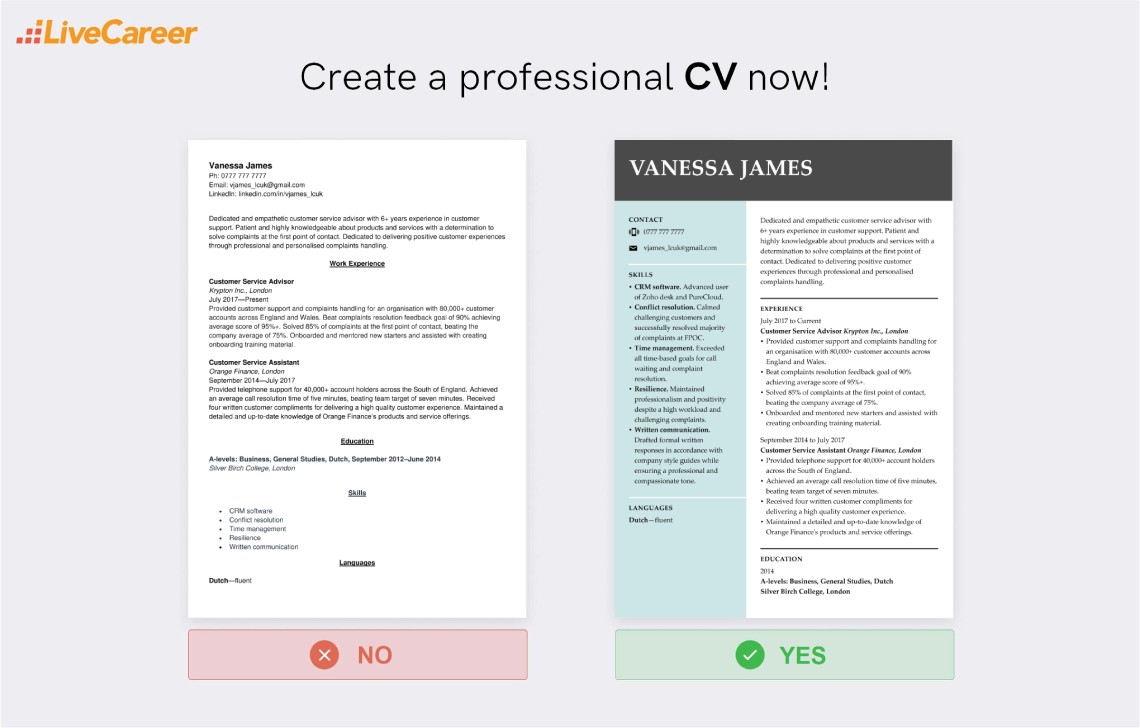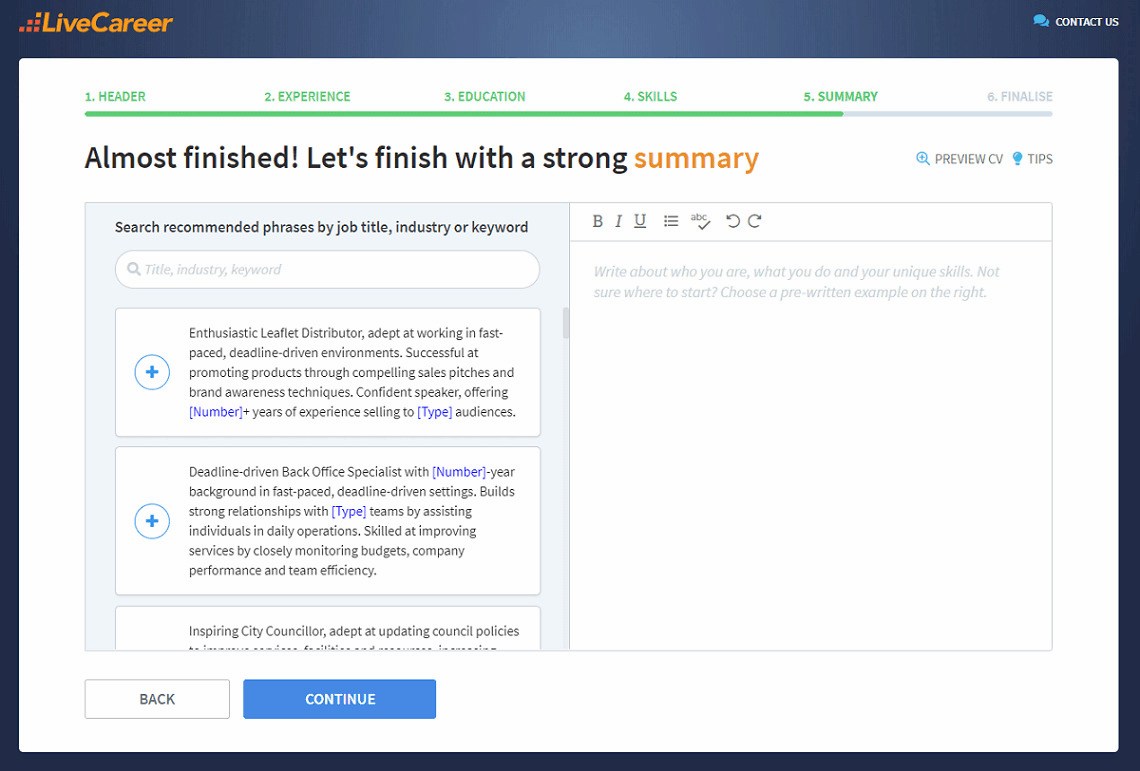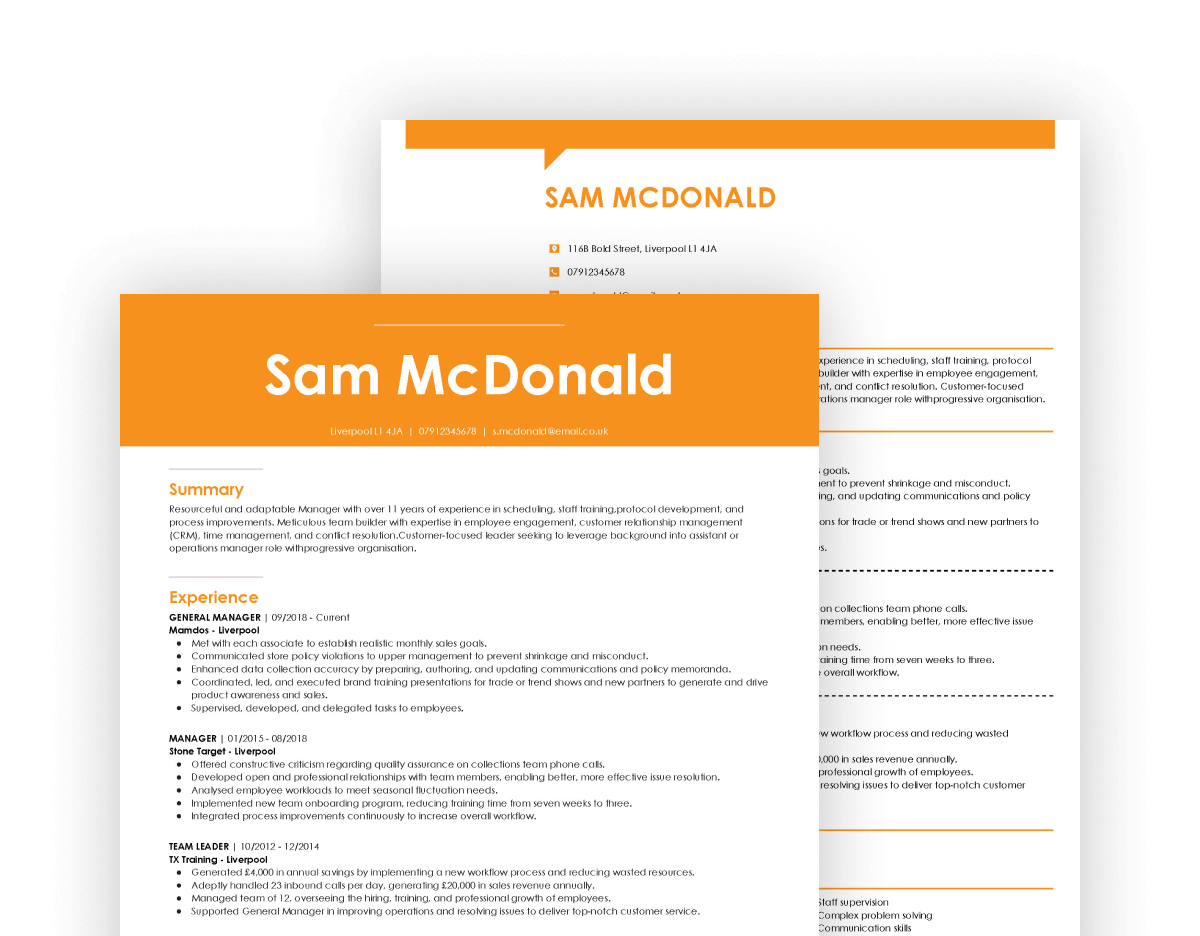
What to Include in a Cover Letter for a Job? (See Examples)
What to include in a cover letter for a job application in the UK? Industry-leading tips on what to put in a cover letter, with examples and explanations.
Our customers were hired by:
Customer service skills are the abilities that help you meet and anticipate customer needs and create a positive customer experience. They’re generally centred around communication and problem-solving and consist mainly of soft skills.
They’re incredibly important for success in the workplace, but you can’t just say you have ‘excellent customer service skills’ and hope for the best. So we’re here to help. You’re about to see a list of the most important key skills for customer service. You’ll also learn how to improve them and how to include customer service skills on your CV.
Create an effective CV in minutes. Choose a professional CV template and fill in every section of your CV in a flash using ready-made content and expert tips.

We created the sample on the right using our builder. See other good CV examples like this one.
Preparing a skills list for a CV? You might want to see these guides, too:
Although customer service skills are important, it's also essential to consider other valuable skills. After analysing 6 million CVs created in our builder, we identified the top 10 most commonly included skills overall*:
*The data comes from a period of the last 12 months (August 2023-August 2024).
Vanessa James
Ph: 0777 777 7777
Email: vjames_lcuk@gmail.com
LinkedIn: linkedin.com/in/vjames_lcuk
Dedicated and empathetic customer service advisor with 6+ years experience in customer support. Patient and highly knowledgeable about products and services with a determination to solve complaints at the first point of contact. Dedicated to delivering positive customer experiences through professional and personalised complaints handling.
Work Experience
Customer Service Advisor
Krypton Inc., London
July 2017—Present
Customer Service Assistant
Orange Finance, London
September 2014—July 2017
Education
A-levels: Business, General Studies, Dutch, September 2012–June 2014
Silver Birch College, London
Skills
Languages
Customer service skills are the abilities and qualities that are essential to communicate with others effectively, assist customers and clients to meet and anticipate the needs of customers and solve their problems. Employees interacting with customers are expected to demonstrate empathy and understaning, and ensure their clients have a positive experience.
Customer service skills are the abilities important in many jobs, not just those that specialise in customer service. So understanding what customer service skills are and how to demonstrate those skills is key to success in many different careers.
The following list of customer service skills is considered essential and worth listing on your CV:
Now, let's dig deeper into each of these skills:
By 2030 it’s estimated that 2.6 million workers will be lacking the basic skills necessary to deliver good customer service. So developing and being aware of the most important skills needed for customer service will stand you in good stead, now and in the future. Here’s the top customer service skills list you’ll need for career success.
Communication skills are well deserving of their number one spot. Ultimately, having excellent customer service skills boils down to your ability to effectively communicate with customers. You need to be able to communicate effectively through a variety of channels and methods, face-to-face, on the phone, online, through speaking and through writing. And you have to be able to communicate clearly and concisely too. Good communication skills are in short supply too, with around a third of applicants lacking the basics.
Patience is undoubtedly one of the top skills required for customer service. Irate customers often take out their frustrations with a product or service on the person they’re speaking to. Taking it personally can negatively affect your own well-being and your ability to do your job effectively. Remember that you’re not the reason for their anger, and that by remaining calm and professionally solving their problems you can flip that anger into a positive experience. And that positive experience is big business, 65% of customers say it’s more influential on their view of a brand than advertising.
Active listening is a subset of communication skills and one of the most powerful examples of good customer service skills. After all, communication is a two-way street. It’s important to make sure you truly listen to your customers to understand their needs. This includes making them feel as if they’re being listened to by using affirmative language to encourage them. Reinforce this and ensure you’ve got the full picture by using open questions to elicit further information and rephrasing the customer’s narrative back to them to make sure you got it right.
Attitude is a huge factor in possessing the skills needed for customer service. And positivity is good for the bottom line too, with 65% of customers reporting they spent more money with a company due to a history of positive customer service experiences. Remain upbeat whilst still maintaining empathy with customers and use positive language to steer conversations. Focus on what can be done instead of what can’t be done.
This customer service skill is related to active listening and positivity, but it’s subtly different. Attentiveness is the skill of making a customer feel they are genuinely being paid attention to as an individual and that their needs are being acknowledged. Cultivate attentiveness by having genuine communication with each individual customer, don’t just stick to scripted responses which can seem generic and impersonal. And once again, this pays off in a business sense too. 64% of customers report customer experience is more important than price when making a purchase.
Continuing to deliver exceptional skills for customer service is an ongoing process. It’s essential to develop and improve your skills for you and your employer to continue delivering the very best. Customer expectations and communication technologies are constantly changing and evolving. And if you fail to deliver then you’re more likely than ever to lose out. 76% of customers report it’s easier than it has ever been to take their business elsewhere and find a company that meets their needs.
Product knowledge is another key skill for customer service. Nothing is more frustrating to a customer than dealing with someone who lacks a basic level of understanding of the products and services their employer provides. It prevents you from understanding a customer’s problems and from being able to suggest effective solutions. So it’s essential you can prove you’re up to speed with your company’s policies, processes, products and services.
Decisiveness plays an important role in any list of customer service job skills. You need to be able to determine the best course of action to solve customers’ issues. How do you solve the problem? Can you provide a solution on the spot or do you need to escalate? What else can you do to help the customer have a better experience? All of these questions are essential considerations and you need to be able to come to a fast and firm decision using your critical thinking skills.
Having good customer service skills means being able to effectively deal with other people. And we humans are notoriously unpredictable. Each customer has unique needs and each day will bring new challenges. The same person may communicate with you in different ways depending on their circumstances on that particular day. Similar situations cause different customers to react in different ways so it’s essential you have the flexibility to deal with varying situations by varying means.
Time management probably isn’t the first thing that springs to mind when it comes to skills needed for customer service. But being able to manage your time effectively is an important consideration. You need to offer good service to the customer you’re dealing with right now, but there’ll always be other customers waiting. It’s important to know how to deal with each customer effectively and quickly. You also need to know when to escalate the issue or pass it on if you can’t resolve it yourself. This skill helps you assist as many customers as possible and avoid worsening situations through a lack of responsiveness. And if you work in a specialist customer service role there’s a very good chance you’ll have time-based targets.
A strong CV summary will convince the recruiter you’re the perfect candidate. Save time and choose a ready-made personal statement written by career experts and adjust it to your needs in the LiveCareer CV builder.

Once you’ve worked hard to develop and improve your skills for customer service, you’ll need to know how to include them in your CV. First, you’ll see how to include customer service skills in a standard CV format, section-by-section. Then you’ll see a list of good customer service advisor skills to include on your CV.
Also known as your CV profile or personal statement, it’s the short paragraph that acts as the introduction to your CV. So show you’ve got the skills needed for customer service right from the start. Include your job title, how much experience you have, and an impressive achievement or skill related to customer service.
Dedicated and empathetic customer service advisor with 6+ years experience in customer support. Patient and highly knowledgeable about products and services with a determination to solve complaints at the first point of contact. Dedicated to delivering positive customer experiences through professional and personalised complaints handling.
Your work experience section should never be just a list of your responsibilities. Use it to maximum effect by highlighting accomplishments and achievements that prove your customer service skills.
Each entry in your work history should have 4–6 bullet points describing the job. Start them off with CV action verbs and structure them by using accomplishment statements. In other words, don’t just say what you did, explain how well you did it. And quantify your achievements and responsibilities with numbers wherever possible. Finally, read the job advert, see what customer service experience is required and make sure you target your own experience and achievements to those particular job requirements.
Customer Service Assistant
Orange Finance, London
September 2014—July 2017
Your CV skills section follows your education section. It’s tempting just to throw in as many customer service skills as you can think of but it won’t do you any favours with recruiters. And on a more practical note, you should be aiming for a CV length of 1–2 pages, so you’re limited by space. You need to write a skills section that’s concise and tailored to each specific job you apply for.
Do this by consulting the job advert again, this time noting all of the specific customer service skills that are required. Then include 5–10 of your own skills on your CV, targetting them to the job requirements as closely as possible. And add a short sentence to each skill with evidence of how you demonstrate it.
Do you feel your skills are your strongest asset as a candidate? Consider writing a skills-based CV that highlights your abilities rather than specific achievements.
Proving you have good customer service skills doesn’t end with your skills section. Adding extra sections to your CV gives you more chances to win over the hiring manager with your abilities. It also helps to make you stand out as a candidate by going over and above the standard CV layout.
Languages
As I’ve already mentioned, delivering good customer service is an ongoing learning process. By undertaking formal training and being aware of the way you interact with customers you can develop great customer service skills. Here’s how to improve your skills for customer service:
Employers are all too aware of the need for a highly skilled workforce. More and more companies offer comprehensive training schemes to their employees so ask your manager what opportunities are available.
Even if your employer doesn’t offer the training you need there’s never been a better time to take the initiative and find training opportunities yourself. And it’s all at your fingertips online. As with any training opportunity though, do your due diligence and check whether the provider you’re looking at is properly accredited. And check out independent review services such as Trustpilot to see the opinions of people who’ve taken the course previously.
The UK government has a useful portal with a wealth of information about career skills and training. Take a look to find out more about how to improve your customer service skills.
Many of the customer service skills you’ve seen are directly related to the ability to empathise with customers. If you work to understand and identify with the feelings the customer is experiencing and respond accordingly then your approach to customer service will improve as a result.
Customer service mainly consists of soft skills, but to deliver it effectively you need to brush up on your hard skills too. Learn to use the equipment, software and systems associated with customer service tasks so you can assist customers with maximum speed and efficiency.
Listen to feedback from managers and colleagues and if you don’t receive enough, ask for it. Then take action to address any areas for improvement. Also take note of satisfaction metrics gathered by your employer to identify further areas of improvement. Many customer service focused industries put a lot of effort into obtaining customer feedback, use the results to your advantage as an opportunity to improve.
It’s all too easy to dismiss good customer service skills. You might think you’re in a role that isn’t customer facing or work for a company that doesn’t offer B2C products and services. But even when you’re dealing purely with other businesses, they’re your customers too. And customer care skills will enable you to deal more professionally with your own colleagues as well. Almost all roles involve elements of customer service.
Unfortunately, a large part of the skills for customer service involves dealing with customers who feel a company or organisation has failed them. Even if the failing isn’t your fault it’s essential to be able to apologise. Firstly, it’s your job and secondly, it’s much easier to deal with a customer who feels appeased.
It seems obvious, but it’s incredibly frustrating for customers when they get fobbed off with excuses and bombarded with detailed technical explanations of why their problem occurred. Customers just want their issues resolved quickly and effectively. So always focus on listening to the customer to find out exactly what the problem is, then offer a solution yourself or if you can’t, pass them onto a colleague who can.
It’s timeless advice for life and for developing skills needed for customer service. Keep calm, be thick-skinned and don’t take customer behaviour personally. Keep positive and professional at all times to prevent problems from escalating out of control. And when you’re dealing with a customer face-to-face that involves your body language too, so keep it open and friendly.
You don’t have to be a CV writing expert. In the LiveCareer CV builder you’ll find ready-made content for every industry and position, which you can then add with a single click.

Thanks for reading. We’re committed to delivering good customer service skills too, so if you’ve got any questions at all about this article or need some help with demonstrating your own skills, ask away in the comments section and we’ll be happy to help.
Our editorial team has reviewed this article for compliance with Livecareer’s editorial guidelines. It’s to ensure that our expert advice and recommendations are consistent across all our career guides and align with current CV and cover letter writing standards and trends. We’re trusted by over 10 million job seekers, supporting them on their way to finding their dream job. Each article is preceded by research and scrutiny to ensure our content responds to current market trends and demand.
About the author
Since 2013, the LiveCareer UK team has shared the best advice to help you advance your career. Experts from our UK editorial team have written more than one hundred guides on how to write the perfect CV or cover letter.
Rate this article:
Customer service skills
Average:


What to include in a cover letter for a job application in the UK? Industry-leading tips on what to put in a cover letter, with examples and explanations.

Are Canva CV templates good for the UK job market? Check our assessment of Canva CV templates and discover the best alternatives for your CV.
![How to List Your Degree on a CV [6+ Examples]](https://cdn-images.livecareer.co.uk/pages/how_to_write_your_degree_on_a_cv_lcuk_1.jpg?fit=crop&h=216&dpr=3)
Learn how to write your degree on a UK CV to ensure it reflects the time and effort you invested, giving it the recognition it truly deserves.
Our customers were hired by: